MobiDataLab Codagon recap: innovative competition delivers innovative innovation!
Inspired by the Greek word for “competition” -Agon, the MobiDataLab Codagon was a fusion of coding work and innovative ideas fostered by competitive settings, brilliantly organised by MobiDataLab partner AETHON. The main objective was to bring about innovative solutions to urban mobility challenges based on data exploitation. The competition attracted many participants: during the preparation phase, 54 teams and 98 individuals subscribed, a testament to the events’ appeal across diverse backgrounds, from startups to research teams. Key successes during the codagon included hosting engaging and informative online sessions, but also collaborations with industry-related organizations, and academic institutions for promotion.
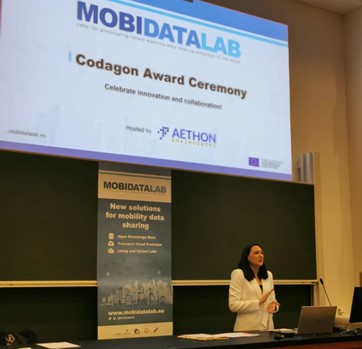
Where it all started...
The MobiDataLab Condagon was the last of three Virtual and Living lab instances organised in the project. Following the Datathon in May and the Hackathon in September, the Codagon in November also aimed at validating the project’s technological outputs, gauging the data sharing culture, and engaging local ecosystems, innovators, and incubators in mobility data sharing and related MobiDataLab actions.
But differently from the Datathon and Hackathon, the Codagon was meant to include expert sessions to foster ideation, discussion, and data generation. These sessions were planned to both enrich the data sharing culture evaluation and support the participants in their innovation development task. In this sense, the sessions supported the promotion of good practices, the alignment of goals, and the reinforcement of collaboration between stakeholders.
The Codagon was therefore planned as a three-week online event followed by an onsite award ceremony. The codagon’s design incorporated panel discussions, strategically used as promotional tools to allure registrations and sustain high engagement levels throughout the three-week execution phase – which represented quite a challenge. Webinars, accessible exclusively to registered participants, established a sense of exclusivity and incentive for participation.
To build the most efficient innovation ecosystem, drawing upon the datathon and hackathon, and based on all the available MobidataLab research results and technical tools developed, an intense planning phase resulted in the following rich and extensive agenda covering the whole Codagon duration.
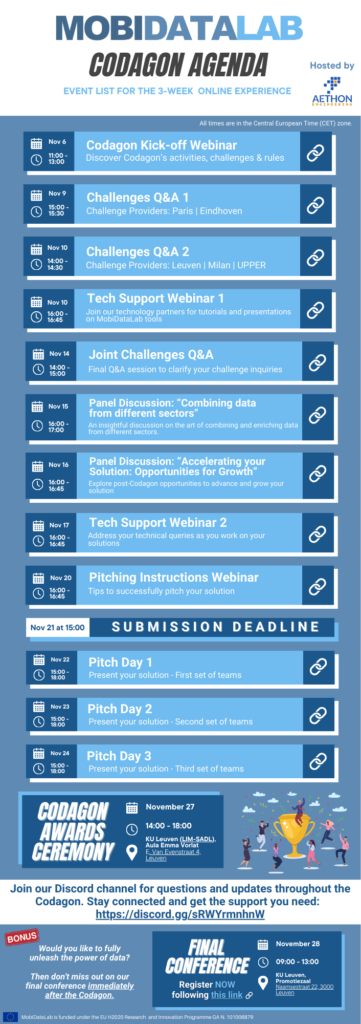
...to grow into an exciting journey!
The rules of the game were introduced at the online kick-off meeting on November 6: developing over three weeks a concrete solution to a mobility problem proposed by a municipality with provided data sets and data exploitation tools.
The kick-off meeting defined the trajectory of the competition with its ultimate goal to transform urban mobility, presented the project and context, and shared the available resources.
The urban mobility challenges proposed were detailed by their authors:
- In Eindhoven (NL), participants were tasked with creating a solution to provide real-time insights into taxi availability and optimize taxi waiting queues, using city parking sensor data, public transprot schedule, and touristic & demographic data among others.
-
- In Leuven (BE), the central task was to work on a tool to identify and plan optimal locations for multimodal mobility hubs, integrating various transportation modes, providing efficient park & ride solutions, and enhancing accessibility to public transport and shared mobility services, with the support of origin/destination matrix data, public transport schedules, off-street parking data, etc.
-
- In Milan (IT), the primary focus was to develop an innovative tool supporting the organisation of large events’ mobility, with an emphasis on accessibility, sustainability, and active mobility, based on demographic data, upcoming local events’ plan, public transport data, and more related inputs – not only publicly available data.
-
- In Paris (FR), the challenge centered around the creation of a tool that facilitates the improvement of the walking environment, modelling pedestrian behaviour, identifying opportunities and potential conflicts with other transport modes, relying on data about pedestrian density, public lightning, road network, public transport and demography, etc.
-
- In the UPPER project – an EU-funded project focused on urban public transport improvement that partnered with MobiDataLab, the main task is to provide objective calculation methodologies for one or more Public Transport Impact Indicators (Greenhouse Gas Emissions, Congestion, Road Safety, Modal Share, Access to Mobility Services, Air Pollution and User Satisfaction), exploiting existing datasets, proposing innovative new calculation methods or even developing alternative indicators that can be calculated with existing datasets, with the support of several data portals: the European Data Portal, the INSPIRE Geoportal, the Copernicus earth observation programme, etc.

The main tool in the whole process was introduced: the VIRTUAL LAB.
The virtual lab is a platform gathering all MobiDataLab data sets into a data catalogue, and providing access to data services developed by the project partners, such as enrichment processors, anonymisation functions, and data discovery support. It was constantly improved along the codagon with participants’ feedback.
Two technical support webinars were planned along the three weeks of remote work and development for the codagon participants, to ensure they would not encounter blocking obstacles with the platform and resources managed by the project partners, and could exploit the project tools to their full potential, unleashing the power of data sharing in the mobility sector.
The Virtual lab platform use was all the more crucial to the codagon success as participants were expected to use it to submit the result of their work – the solution they propose to the challenge provider and the codagon jury for rewards. This process was explained in the kick-off meeting as well.
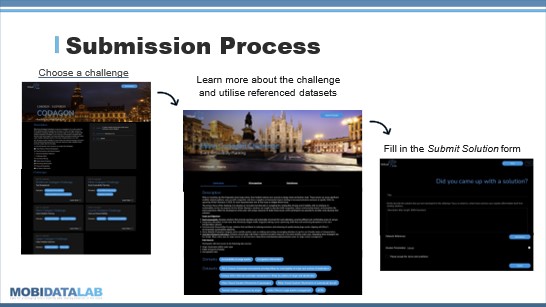
Success relies on seized opportunities
As the very complete programme of the codagon showed, panel discussions served as a vital component of the Codagon competition, designed to fulfill several key objectives. These discussions aimed to provide participants with valuable insights, foster discussions on pertinent topics, and enhance their understanding of the challenges and opportunities in the field, aligning with MobiDataLab’s use cases. Two panel discussions were organized as integral parts of the Codagon competition.
The first codagon panel discussion, held on the 15th of November 2023 at 16:00 CET, explored the methods, tools, and success stories related to cross-sector data fusion. Participants had the opportunity to engage with experts who have mastered the art of combining data from various sectors. The discussion aimed to provide insights into innovative approaches for leveraging data in the context of urban mobility.
The second codagon panel discussion, held on the 16th of November 2023 at 16:00 CET, delved into post-Codagon opportunities for participants to advance and grow their solutions. Attendees had the chance to connect with key initiatives and explore resources, funding options, and collaborative avenues. The discussion provided insights into the dynamics of team success and adaptability as crucial factors for solution growth.
Finally, the Pitching Instructions Webinar, hosted with the help of F6S MobiDataLab partners on the 20th of November at 16:00 CET, played a vital role in preparing participants for the final pitching sessions. Participants received valuable insights into the art of delivering impactful pitches. The session covered techniques for structuring presentations, engaging the audience, and conveying the uniqueness and value of their solutions effectively.
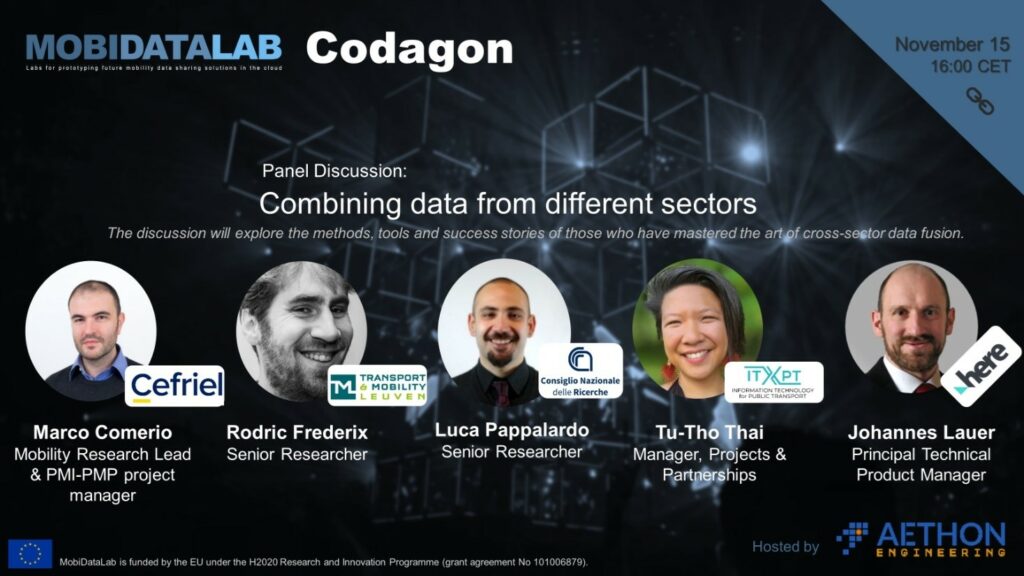
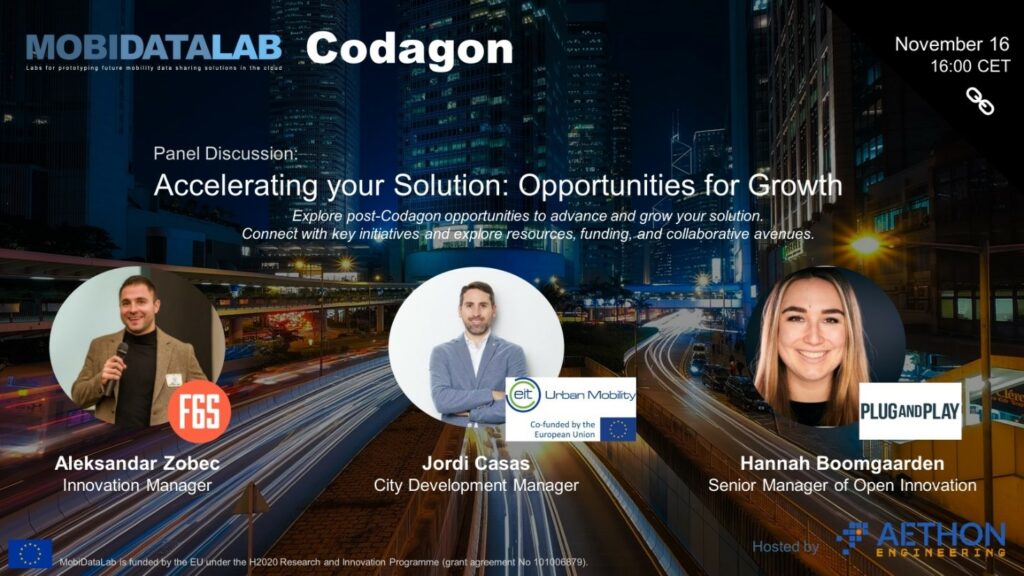
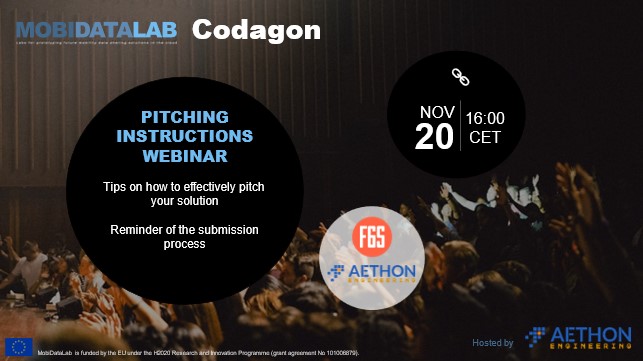
Both the panel discussions and the pitching instruction webinar proved to be valuable resources for the codagon participants and received positive feedback from them. valuable insights into data fusion and post-competition opportunities for solution growth. Participants appreciated the opportunity to engage with experts and gain knowledge that could contribute to their success in the Codagon competition and beyond. These sessions equipped them with the necessary knowledge and skills to deliver engaging pitches and provided a clear overview of the submission process. This preparation was instrumental in helping participants confidently present their innovative solutions during the final pitching sessions, thereby contributing to the overall success of the Codagon competition.
And even more on *shiny* staging
To crown the participants’ hard work, the codagon online phase ended with presentations of the solutions by the participants themselves to a jury of experts analysing the relevance of the solutions in relation to the challenges, but also the innovative aspect of the ideas proposed, their concrete impacts on urban mobility and society, their technical feasibility, and finally the quality of the pitch delivered.
After all the steps happening during the three weeks of online collaboration, 11 innovative solutions were submitted by talented participants who showcased their prowess in addressing urban mobility challenges. These solutions underwent a rigorous evaluation process, culminating in a comprehensive assessment by the Codagon Review Committee on November 22nd, just after the pitching session.
The Codagon pitching session followed a structured agenda, with a 5-minute pitch per solution followed by a 5-minute Q&A with the Review Committee. Teams began by introducing themselves, providing context on their background, experience, and the motivation behind their participation in the Codagon. The core of the pitching session was the presentation of the innovative solutions developed by the participating teams, including their ideas, methodologies, and the potential impact of their solutions on the Codagon challenges. The jury questions after the presentations allowed for deeper insights into the solutions and provided a platform for constructive feedback.
The Pitching Session was a critical component of the Codagon competition, as it provided participants with the chance to demonstrate the practicality and feasibility of their solutions. This session also contributed to the competitive spirit of the Codagon, as teams aimed to convince the judges of the potential of their solutions. It allowed for a direct interaction between participants and the panel of judges.

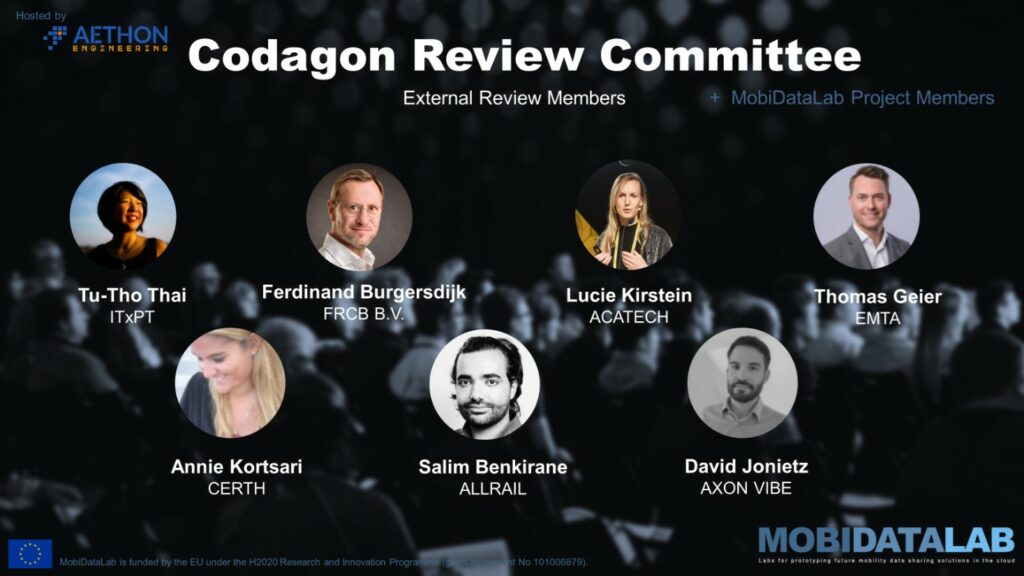
AND THE WINNER IS...
To conclude the codagon and properly reward the winners – but also leave a message to all participants, jury members and related entities of enthusiasm and community for the future, an on-site award ceremony was organised. It took place at the historic Emma Vorlat Auditorium at the university KU Leuven near Brussels, on November 27 – the date was chosen to enhance the particpation of a wider audience connected to the POLIS conference happening in Leuven in the same week.
At the onsite Award Ceremony, the codagon finalists selected after the pitching session had the unique opportunity to present their groundbreaking solutions not only to Codagon’s stakeholders but also to the challenge providers themselves, as well as all the event participants since the ceremony was public. This live pitching session allowed participants to receive valuable feedback and insights directly from the cities and experts who provided the challenges.
The ceremony was the stage where the curtains lifted, and the winners were finally unveiled, celebrating the innovation, dedication, and transformative impact that the Codagon competition had generated. It was a momentous event that underscored the collaborative spirit and the potential for positive change in the field of urban mobility.
SCROLL FURTHER FOR THE WINNERS… 😉
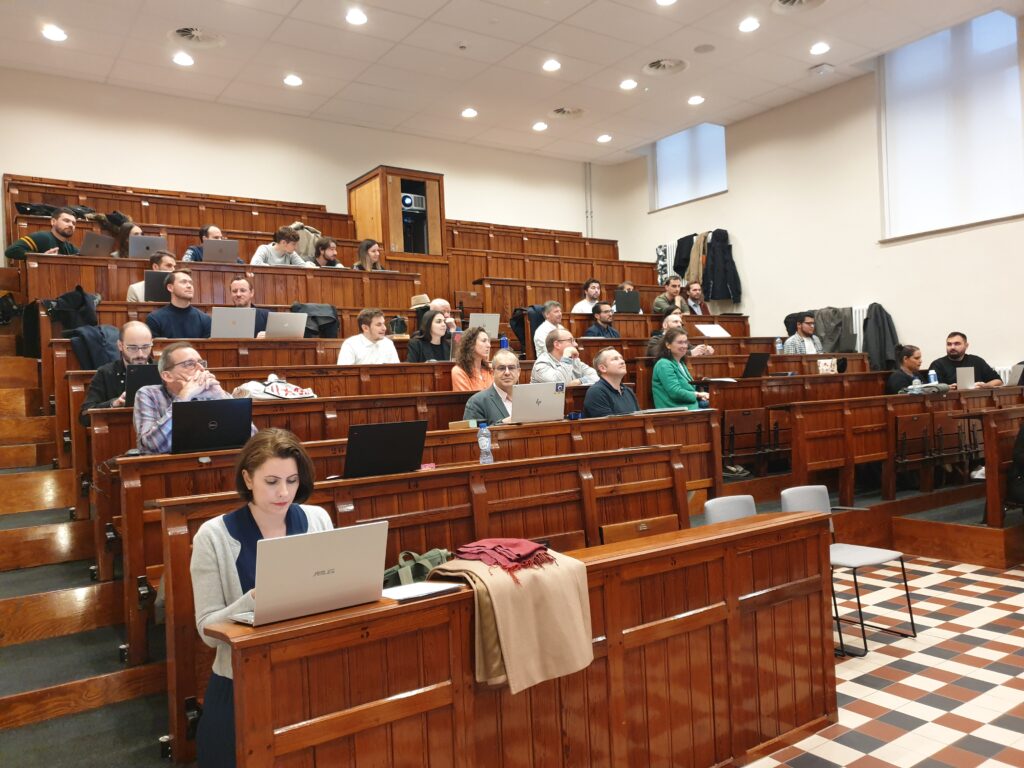
1st PRICE
The “Optimal Hub Placement” team from the Leuven Codagon Challenge won the MobiDataLab Codgaon, earning themselves the price of 5000€!
The two students in Data Science & Business Intelligence at the University of Pisa developed a software tool for policymaking through optimal hub placement, aiming to reduce reliance on private cars. The solution utilizes an algorithm to score potential hub locations, incorporating factors like parking availability, demographics, traffic, and bike network connectivity.
2nd PRICE
The “Global Fusion Squad” team, who had formed and placed 1st in the datathon, and taken the 2nd spot in the hackathon, placed second again in the Codagon. This strong team with diverse backgrounds showed an impressive dedication to leveraging data for social good, specifically in improving city navigation and sustainable mobility solutions.
Their solution “CITIVA” for the Paris challenge leveraged data to improve urban accessibility, particularly for the upcoming Olympics and Paralympics in Paris, emphasizing walkability and sustainable mobility. Their solution proved to be a valuable tool for city planners and residents alike.
3rd PRICE
The “Harmony” team was awarded third place in the Codagon competition, with their solution addressing traffic congestion during large events in Milan.
The team, consisting of researchers and collaborators from the University of Milano-Bicocca, used diverse skills in data integration, semantic interpretation, and software development to include pre-event and post-event strategies, integrating gamification and personalized journey recommendations to manage crowd distribution and alleviate traffic congestion effectively.
UPPER PRICE
A special price was awarded to the UPPER challenge due to its specific approach and creation for the codagon. The HiveLine team won this price with their unique urban mobility modal share calculation toolset.
The diverse team built within the codagon used a data-driven and agent-based simulation to design an affordable, flexible, customizable, and repeatable tool to strengthen public transport usage in cities.




Since the codagon was the last Virtual and living lab instance, it was a great challenge to bring the cooperation and innovation level even higher then in the previous instances, and to leave a trace for future data sharing support and encouragement. The post-event phase included feedback collection and promotion of the solutions presented, reinforced with the delivery of the financial prices, which should help the participants to advance their activities in the fields of mobility data sharing and exploitation for urban mobility improvement. The event’s lessons learned will be shared with subsequent communities and the connections built with all parts of the MobiDataLab community – innovators, challenge providers, panellists, reviewers, project partners, and institutions involved – will be kept on in future activities to support the momentum created within this project and continued at the European institutional and research and innovation levels.
The MobiDataLab partners extend their gratitude to all those who contributed to Codagon’s success. Together, all these stakeholders have taken a significant step towards a smarter, more efficient urban future, driven by data, innovation, and the relentless pursuit of progress. The Codagon initiative may conclude, but its impact will endure, serving as an inspiration for future endeavours in the field of mobility data sharing.
